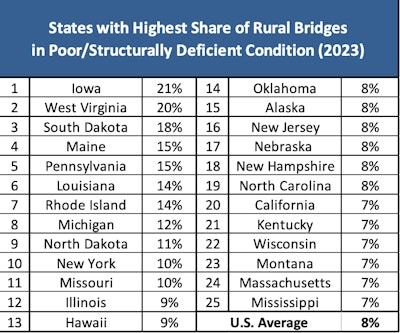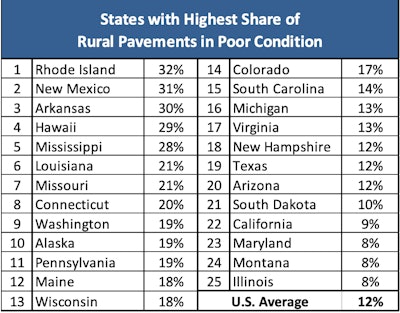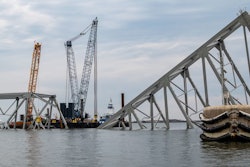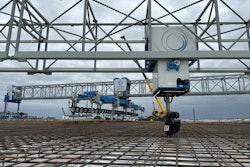
Iowa, West Virginia and South Dakota lead the nation in their percentage of rural bridges and structures rated in poor condition.
That's according to a new study from transportation research nonprofit TRIP, which examined the U.S. rural roads and bridges in need of repair by state. The backlog of needed repairs totaled $198 billion.
According to UDSOT, the backlog breaks down to $97 billion for rural road and highway rehabilitation, $53 billion for needed rural bridge rehabilitation, and $48 billion for needed rural roadway expansions and enhancements.
The U.S. Census Bureau defines rural areas as regions outside of urban areas with a population of 2,500 or more. About 20% of the U.S. population lives in these areas.
 Overall, 8% of rural bridges in the U.S. are rated in poor/structurally deficient conditio.TRIP
Overall, 8% of rural bridges in the U.S. are rated in poor/structurally deficient conditio.TRIP
Iowa had the highest percentage of its rural bridges classified as poor condition or structurally deficient, at 21%. West Virginia followed at 20%, and South Dakota had the third-highest percentage at 18%. The national state average is 8%.
Overall, 8% of rural bridges in the U.S. are rated in poor/structurally deficient condition, and 48% are in fair condition.
Bridges rated poor/structurally deficient are defined as having significant deterioration to the major components. As a result, these bridges are often posted for lower weight or closed to traffic.
 A key concern for the prominence of poor condition rural roads in particular is their high rate of fatalities.TRIP
A key concern for the prominence of poor condition rural roads in particular is their high rate of fatalities.TRIP
Looking at rural roads, Rhode Island leads with 32% of its rural pavements in poor condition, followed by New Mexico at 31% and Arkansas at 30%. The national average is 12%.
Nationwide, 12% of U.S. rural pavements are rated in poor condition, and 19% are in mediocre condition.
A key concern for poor rural roads is their high rate of fatalities, which in 2022 was nearly double the rate on all other roads – 2.01 fatalities per 100 million vehicle miles versus 1.12.
Nationwide, there were 15,121 fatalities on rural roads in 2022.
“This report underscores the need for infrastructure investment in rural America to ensure the roads, bridges, and highways our nation’s equipment manufacturers rely on are efficient, safe, and reliable,” said Todd Stucke, president of Kubota Tractor Corporation and chair of the Association of Equipment Manufacturers. “Our freight transportation network – which largely consists of rural communities where our food, fiber, and fuel is produced – remains a vital part of our economy’s supply chain. Allowing it to fall into a state of disrepair will not only cost us more money down the road to modernize, but it will also disrupt our industry’s ability to remain competitive globally.”
A recent analysis from the American Road & Transportation Builders Association found that nearly 221,800 bridges in the U.S. are in need of serious repair. This is the fourth year in a row where the number of bridges in need of major repair or replacement has declined.












